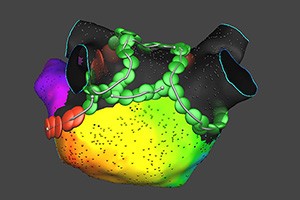Uncontrolled hypertension is a dangerous condition that can lead to heart attack, stroke and even death. According to the Centers for Disease Control, more than 75 million Americans have high blood pressure and only half of them have the condition under control.
Cardiologists in the Brookwood Baptist Health System are participating in a study to evaluate the safety and effectiveness of the ROX Coupler, a new device developed by ROX Medical that may help patients with uncontrolled hypertension.
The CONTROL HTN-2 study is a multi-center, blinded trial that will include up to 30 study sites in the U.S. The first procedure was performed at Princeton Baptist Medical Center in Birmingham by interventional cardiologist Farrell O. Mendelsohn, MD, a physician partner at Cardiology, P.C. "Our entire research team at Cardiology, P.C. is excited about implementing this research study for our patients. The ROX Coupler technology may offer an alternative option to treat the global problem of uncontrolled hypertension," says Mendelsohn, the principal investigator for the research protocol.
Physicians at Cardiovascular Associates (CVA) are also participating in the study. Gary S. Roubin, MD, FACC, Medical Director and an interventional cardiologist at CVA, says he and his associates are excited to be a part of evaluating this new technology. "This is a Food and Drug Administration (FDA) randomized trial, and our patients have the choice of two convenient hospitals in the area and the potential to receive benefits from this trial," he says.
For the study, half of the participants will receive the ROX Coupler device and the other half will have a procedure to measure important hemodynamics but will not receive the device. "The procedure to insert the ROX coupler is simple and quick and has proven to be safe in the hands of qualified interventional cardiologists," Roubin says. "Patients will be monitored for six to 12 months, and they will not know whether they received the device. Neither will the physicians who are monitoring their blood pressure, so there will be no bias."
Roubin adds that while the trial participants in the control group won't have the device, they will receive the most expert care for their blood pressure. "Should the trial prove to be effective and the device receives FDA approval, the control group members will be given the option of receiving the device at that time," he says.
Mendelsohn says the procedure is a novel approach to controlling high blood pressure. "The procedure involves going into both the iliac artery and vein, which run side by side like a railroad track. In the artery, there is a corkscrew-type wire that serves as a target. We then enter the vein and direct a needle from inside the vein into the artery directed at the target wire," he says. "Once we've gone from the vein to the artery with the needle, we pass the wire through the needle so that a wire serves as a track from the vein into the artery. Once the wire is in position between the vein and artery, we insert the ROX Coupler delivery system into the vein and pass it through into the artery. That creates an arterio-venous anastomosis or passageway."
Mendelsohn likens the shape of the coupler to that of an hour glass. "We position the hour glass-shaped metallic device partly in the arterial side and partly in the venous side. Then we go back in with a four- millimeter angioplasty balloon and open up the middle part of the hourglass device, which allows high-pressured blood from the iliac artery to go into the lower pressured iliac vein. The procedure takes less than an hour and is performed under local anesthesia."
Both Roubin and Mendelsohn encourage physicians to talk with their hypertensive patients who might be candidates to participate in the trial. Principal investigators in the Brookwood Baptist Health System include:
Cardiology P.C at Princeton Baptist Medical Center (205) 780-4330
Dr. Alain Bouchard - Principal Investigator, Hypertension Management
Dr. Farrell O. Mendelsohn - Principal Investigator, Interventional Cardiology
Cardiovascular Associates at Brookwood Baptist Medical Center (205) 510-5000
Dr. Andy Miller - Principal Investigator, Hypertension Management
Dr. Gary Roubin - Principal Investigator, Interventional Cardiology
"This is a fundamental paradigm shift that, I think, can greatly improve the quality of life for patients with difficult-to-control blood pressure. We've seen that already in the people we have treated," Mendelsohn says. "We can offer patients with uncontrolled hypertension something that can drop their blood pressures quickly and significantly. We believe this procedure will improve clinical outcomes dramatically."












